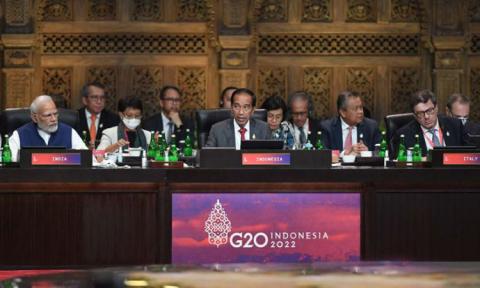Goodbye G20, hello BRICS+

By Pepe Escobar
The redeeming quality of a tense G20 held in Bali – otherwise managed by laudable Indonesian graciousness – was to sharply define which way the geopolitical winds are blowing.
That was encapsulated in the Summit's two highlights: the much anticipated China-US presidential meeting – representing the most important bilateral relationship of the 21st century – and the final G20 statement.
The 3-hour, 30-minute-long face-to-face meeting between Chinese President Xi Jinping and his US counterpart Joe Biden – requested by the White House – took place at the Chinese delegation's residence in Bali, and not at the G20 venue at the luxury Apurva Kempinski in Nusa Dua.
The Chinese Ministry of Foreign Affairs concisely outlined what really mattered. Specifically, Xi told Biden that Taiwan independence is simply out of the question. Xi also expressed hope that NATO, the EU, and the US will engage in "comprehensive dialogue" with Russia. Instead of confrontation, the Chinese president chose to highlight the layers of common interest and cooperation.
Biden, according to the Chinese, made several points. The US does not seek a New Cold War; does not support "Taiwan independence;" does not support "two Chinas" or "one China, one Taiwan"; does not seek "decoupling" from China; and does not want to contain Beijing.
However, the recent record shows Xi has few reasons to take Biden at face value.
The final G20 statement was an even fuzzier matter: the result of arduous compromise.
As much as the G20 is self-described as "the premier forum for global economic cooperation," engaged to "address the world's major economic challenges," the G7 inside the G20 in Bali had the summit de facto hijacked by war. "War" gets almost double the number of mentions in the statement compared to "food" after all.
The collective west, including the Japanese vassal state, was bent on including the war in Ukraine and its “economic impacts” – especially the food and energy crisis – in the statement. Yet without offering even a shade of context, related to NATO expansion. What mattered was to blame Russia – for everything.
The Global South effect
It was up to this year’s G20 host Indonesia – and the next host, India – to exercise trademark Asian politeness and consensus building. Jakarta and New Delhi worked extremely hard to find wording that would be acceptable to both Moscow and Beijing. Call it the Global South effect.
Still, China wanted changes in the wording. This was opposed by western states, while Russia did not review the last-minute wording because Foreign Minister Sergey Lavrov had already departed.
On point 3 out of 52, the statement “expresses its deepest regret over the aggression of the Russian Federation against Ukraine and demands the complete and unconditional withdrawal of armed forces from the territory of Ukraine.”
“Russian aggression” is the standard NATO mantra – not shared by virtually the whole Global South.
The statement draws a direct correlation between the war and a non-contextualized “aggravation of pressing problems in the global economy – slowing economic growth, rising inflation, disruption of supply chains, worsening energy, and food security, increased risks to financial stability.”



























